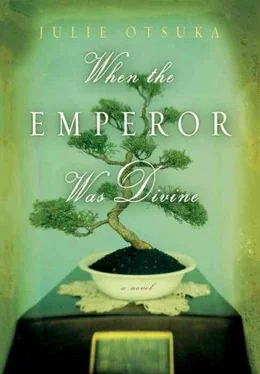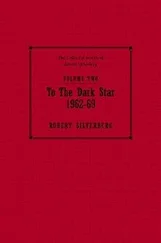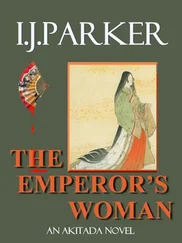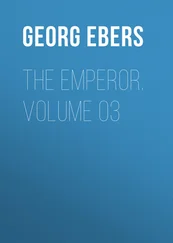As the soldier made his way down the aisle calling out, “Shades down, shades down,” in his deep, melodic bass, she chimed in with him softly under her breath. And then, in a voice that was not soft at all, she called out, “Sir!” She had not meant to call out “sir” but the word had come out anyway. “Sir!” she said again. She could not help herself. “Sir sir sir! ”
The soldier did not hear her.
As she leaned back in her seat the old man in front of her turned around and said something to her in Japanese. His face was deeply tanned and his neck was thick with wrinkles from many years in the sun. One of his hands was missing two fingers. The girl shook her head and said she was sorry, she only spoke English.
“So so so,” said the man. He turned away and pulled down the shade and the car grew a little darker.
When the soldier reached the end of the car he touched the gun on his hip, lightly, with his right hand, to make sure it was still there, and she thought of how he had touched her shoulder the same way—lightly, and with that same hand—and she hoped he would come back again. Then the last shade went down and the darkness was complete and she could not see the soldier at all. Now she could not see anyone at all and no one outside the train could see her. There were the people inside the train and the people outside the train and in between them there were the shades. A man walking alongside the tracks would just see a train with black windows passing by in the middle of the day. He would think, There goes the train, and then he would not think about the train again. He would think about other things. What was for supper, maybe, or who was winning the war. She knew it was better this way. The last time they had passed through a city with the shades up someone had thrown a rock through one of the windows.
The train slowed and crossed a wooden trestle over the dry bed of a river and then there were no more towns by the tracks, there was only the highway, and it was all right to raise up the shades. The girl pulled on the string at the bottom of the shade and the car flooded with sun.
“Do you think we’ll see horses?” her brother asked her.
“I don’t know,” said the girl. Then she remembered the mustangs she had read about in National Geographic. The Spaniards had brought them over hundreds of years ago and now there were thousands of horses just roaming around, wild. Every autumn they came down from the hills to graze on the high desert plains. If a cowboy needed a new horse all he had to do was go out into the desert and get himself one. It was as simple as that. She imagined a cowboy snapping his fingers and a horse, a wild white stallion, galloping up to him in a cloud of hot swirling dust.
So she told the boy that they probably would. They probably would see some horses. Because there were more wild horses in Nevada than in any other state. She had read that in the National Geographic too.
“How many do you think we’ll see?”
“Quite possibly, eight.”
The boy seemed satisfied with this answer. He laid his head down on his sister’s lap and drifted off to sleep.
The girl was still too exhausted to sleep. She leaned against the window and tried to remember when her brother had first started talking about horses. It had begun, she was almost sure of it, at Tanforan. All summer long they had lived in the old horse stalls in the stables behind the racetrack. In the morning they had washed their faces in the long tin troughs and at night they had slept on mattresses stuffed with straw. Twice a day when the siren blew they had returned to the stalls for the head count and three times a day they had lined up to eat in the mess hall on the ground floor of the grandstands. On their first night there her brother had plucked the stiff horse hairs out of the freshly whitewashed walls and run his fingers along the toothmarks on top of the double Dutch door where the wood was soft and worn. On warm days he had smelled the smell of the horses rising up through the damp linoleum floors and on rainy days when she had stayed inside writing letters to her father in Fort Sam Houston or Lordsburg or wherever it was that he happened to be her brother had gone out in his raincoat and his red rubber boots and walked around and around the muddy racetrack. One night when the flies were very bad and they could not sleep he had sat up suddenly in his cot and told her that when he grew up he wanted to be a jockey. The boy had never been on a horse before in his life. “A jockey is a small man,” she had said to him. “Do you want to grow up to be a small man?” He could not make up his mind. Did he want to ride the horses? He did. Did he want to be a small man? He did not. “Ride horses!” Mr. Okamura had shouted from the stall on the other side of the partition. “Eat lots, grow up to be big American boy!” shouted Mr. Ito from two stalls down. The next day the carpenters had come and nailed wire mesh over the windows and after that the flies were never so bad and for a long time the boy did not talk to her about horses or anything else late at night, he just slept.
BY LATE AFTERNOON the train had run out of water. The sun shone through the dirty glass panes and the air inside was stuffy and hot. During the night in the mountains above Tahoe the steam heat had gone on and now they could not turn it off. Or maybe they could but they wouldn’t, the girl didn’t know. She was sweating and her mouth was dry.
“Look at this,” the boy said to her. He was leafing through the pages of a book— Big Game Hunting in Africa. He stopped and pointed to a glossy photograph of a wild bull elephant charging through the African bush. “What do you think happened to the man who took this picture?”
The girl narrowed her eyes for a moment and thought. “Trampled,” she said.
The boy stared solemnly at the elephant for a long time and then he turned the page. A herd of gazelles was leaping gracefully across the savanna. The girl stood up and walked to the front of the car to wait for the toilet.
As she took her place in line she reached up to fix the bow in her hair. Her mother had tied it for her that morning but she had made it too loose. The girl yanked the bow tight but the ribbon snapped and her hair came tumbling down. She tossed the ribbon to the floor.
“Are you all right?” asked the man behind her. His hair was flecked with gray around the temples but she could not tell if he was young or old. He wore round steel-rimmed glasses and a handsome gold watch that no longer told the correct time.
“I don’t know,” she said. “How do I seem?”
“I think you’re all right.” He bent over and picked up the torn ribbon and carefully tied the two ends together. His fingers were long and fine and they moved with great precision. He tugged once at the knot to make sure it would hold and it did.
“You can keep it,” said the girl.
“It’s not mine to keep,” said the man. He gave the ribbon back to her and she slipped it into her pocket.
“It’s hot in here, isn’t it?”
“Very,” said the man. He pulled out a handkerchief and began to wipe his brow.
As the train rounded a curve the girl felt her legs sway beneath her. She reached out and steadied herself against the wall. “Last night it was too cold,” she said, “but now it’s so hot I can hardly breathe. Everything keeps on changing.”
“Isn’t that right,” said the man.
She looked at the letters embroidered in gold thread on the corner of his handkerchief and asked him what the “T” stood for.
“Teizo. But my friends just call me Ted.”
“And the ‘I’?”
“Ishimoto.”
“Can I call you Ted?”
“If you like.”
Читать дальше












